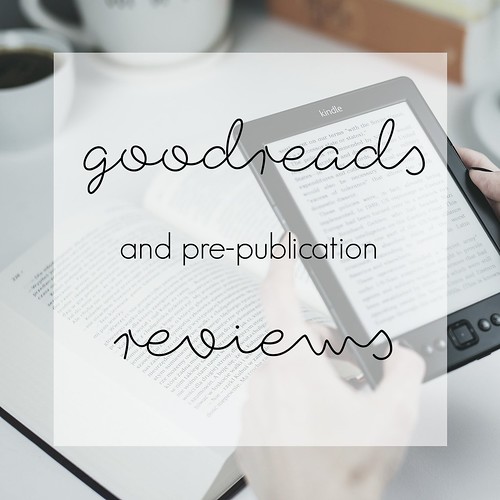Goodreads, we all love it. Like many other book bloggers, I review every single book I read on Goodreads as well as my blog and also rely on it for a lot of my bookish information. (I honestly don't know what I'd do without it.) Something that sets Goodreads apart from a lot of other websites though, is that it allows reviews to be published well before the book is actually released. This can be an amazing thing because it allows books a lot of pre-publication publicity and is a major factor in the hype more popular books receive. But like all good things, it also has a downside.


So what's the problem?
If you've been away from the Twittersphere in the last couple weeks, you may have missed a few things. Specifically, there have been a couple authors who have been the targets of what were essentially smear campaigns. A couple of weeks ago it was Sarah J. Maas, whose fans became infuriated by spoilers about her new book. This week it was Laura Silverman who was hit with the wrath of Trump supporters. I'm sure here have been others but these are the two I was at least kind of around to witness (I honestly use Twitter mostly for messages and trades). In both cases the angered parties took to Goodreads and this is where the downside comes in.
Because Goodreads allows pre-publication reviews of books, it is not uncommon for fans and haters to leave reviews as soon as a book appears on the site. Even worse that that, in cases like these, readers (and non-readers) have a tendency to use Goodreads to make their opinions known. Both Sarah J. Maas and Laura Silverman were both bombarded with one star reviews, the latter book not even being out of edits yet.

Luckily for Sarah J. Maas, her book was being released within days and she has a massive fan base so the one star reviews really didn't have much affect when all was said and done. Her fans also rallied behind her and countered the bad reviews with good ones, although they hadn't read the book either. Laura Silverman's book, however, is not being published until next spring and no ARCs even exist yet. Her ratings quickly plummeted below two stars. Thank goodness Goodreads and her publisher (with the help of Twitter users who flagged the obviously fake reviews) took action to remove the troll reviews, but it's terrifying to think that someone's reputation or livelihood could be damaged by people who disagree with an author's opinions. Which brings me today's issue:
Should Goodreads allow reviews before a book is released?
I'm going to be honest, I love that Goodreads lets me post ARC reviews early! If they didn't, chances are I'd probably forget to post there at all, as is sometimes the case with Amazon. The way things are now I have the ability to post a review here and there at the same time, regardless of how early I get to read an ARC. It's my system and I love it! But people abuse it and that sucks.

Although Amazon owns Goodreads, they allow this on their book-only website, possibly precisely to help hype books that will later be purchased on Amazon itself. I don't know what their reasoning is, but is it time to change it? With these two authors in particular the book community and Goodreads did a good job of counteracting the trolls, but what about smaller indie authors who don't have the kind of following who can make a difference?
The other side of this is that it could happen at any time, even after a book is published. I've seen this happen on Amazon years after a book is released when an author pisses off the wrong group of people at the wrong time. Anne Rice is a prime example. Perhaps the answer is simply to continue monitoring reviews and weeding out the trolls.
But are there other possible solutions?
The most obvious way to stop troll reviews before publication would be to not allow pre-publication reviews at all. I don't see this happening though for reasons I've outlined already. Many authors count on reviewers posting on Goodreads well before their book's release date to spread the word. While this could still be done on blogs, the reach wouldn't be nearly as wide.
One suggestion I've seen floating around is that there should be some way to verify whether or not a reader actually has an ARC in order to post a review before a book's publication date. While this sounds like an awesome solution, I have no idea how it could possibly be enforced. People get ARCs in so many different ways - Netgalley, book events, trades, giveaways. If this actually could be enforced though, I would definitely get behind it!
Where do you stand on this issue? Do you think there's a solution?
Let me know in the comments!

 Goodreads, we all love it. Like many other book bloggers, I review every single book I read on Goodreads as well as my blog and also rely on it for a lot of my bookish information. (I honestly don't know what I'd do without it.) Something that sets Goodreads apart from a lot of other websites though, is that it allows reviews to be published well before the book is actually released. This can be an amazing thing because it allows books a lot of pre-publication publicity and is a major factor in the hype more popular books receive. But like all good things, it also has a downside.
Goodreads, we all love it. Like many other book bloggers, I review every single book I read on Goodreads as well as my blog and also rely on it for a lot of my bookish information. (I honestly don't know what I'd do without it.) Something that sets Goodreads apart from a lot of other websites though, is that it allows reviews to be published well before the book is actually released. This can be an amazing thing because it allows books a lot of pre-publication publicity and is a major factor in the hype more popular books receive. But like all good things, it also has a downside.



















